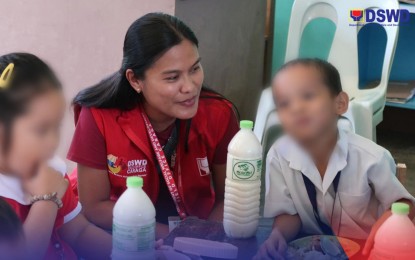
FEEDING PROGRAM. A Department of Social Welfare and Development (DSWD) personnel talks to the recipients of the government’s Supplementary Feeding Program in this undated photo. The DSWD on Monday (April 6, 2024) said over 1.5 million children nationwide have benefitted from the program for the school year 2023-2024. (DSWD photo)
MANILA – Sitting as chair of the Inter-Agency Task Force on Zero Hunger (IATF-ZH), the Department of Social Welfare and Development (DSWD) has led the nourishment of over 1.5 million children nationwide with its Supplementary Feeding Program (SFP) for the school year 2023-2024.
Assistant Secretary for Disaster Response Management Group (DRMG) Irene Dumlao said the DSWD has served 1,526,261 children enrolled in Child Development Centers (CDCs) and 33,198 children under Supervised Neighborhood Play (SNP) in 1,169 implementing local government units (LGUs) as of March 30.
“As mandated by the Marcos administration, through the recently signed Memorandum Circular No. 47 which calls for the intensified support for the government’s anti-hunger efforts, the DSWD will continue its collaboration with national agencies, LGUs, and development partners to strengthen our feeding program,” Dumlao said in a news release on Monday.
The SFP is one of the DSWD’s anti-hunger initiatives and the agency’s contribution to the Early Childhood Care and Development (ECCD) program of the government and Republic Act 11037 or the Masustansyang Pagkain para sa Batang Pilipino (Nutritious Food for Filipino Children) Act.
“We are continuously monitoring and fast-tracking the implementation of the program before the school year ends, in partnership with the LGUs,” Dumlao said.
The SFP provides food to children aged 3 to 5 who are currently enrolled in CDCs, while children aged 2 to 4 in SNP are fed using indigenous or locally-produced food equivalent to 1/3 of the Recommended Energy and Nutrient Intake.
Aside from nutritious food provision, Dumlao said the program is also aimed to improve the knowledge, attitude and practice of children, parents and caregivers through intensified nutrition and health education, and sustain the children’s nutritional status.
The DSWD vowed to prioritize programs that ensure food security to bolster government efforts to attain zero hunger in the country. (PNA)
